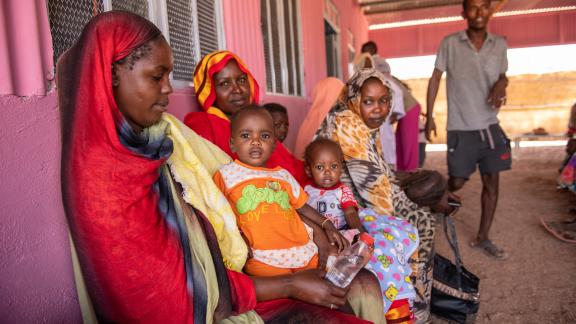It's mid-morning, and the Um Rakuba refugee camp on the southern border of Sudan is hot. There are few trees to take shade from the 40°c heat. The dusty main road is bordered on both sides by rows upon rows of huts and tents, temporary accommodation established by The United Nations High Commissioner for Refugees (UNHCR) for the tens of thousands of refugees who have fled over the border from neighbouring Ethiopia since fighting broke out between government forces and the Tigray People’s Liberation Front (TPLF) in November 2020. The severe humanitarian crisis has left more than 5 million people facing starvation.
This week, peace talks mediated by the African Union are taking place in South Africa in an aim to break the bitter impasse between the Tigray region and the Ethiopian federal governments and bring succour to the desperate people caught in the middle.
Many arrivals tell of being victims of armed groups, facing perilous situations, including looting of their houses, forceful recruitment of men and boys and sexual violence against women and girls. Refugees are arriving with little more than the clothes on their backs, fatigued and in weak conditions after sometimes days of travel.
The main road of the camp is peppered with the temporary offices of well-known charities, some providing food aid, others medical care. But there is only one clinic that has bright pink walls and welcomes women, girls, and men inside for free sexual and reproductive healthcare. The Sudan Family Planning Association (SFPA) quickly established a presence here once refugees started to arrive as they understood sexual and reproductive health is not only vital for women’s health and safety but very often overlooked by the humanitarian community.
when
country
Sudan, Ethiopia
region
Africa
Related Member Association
Sudan Family Planning Association
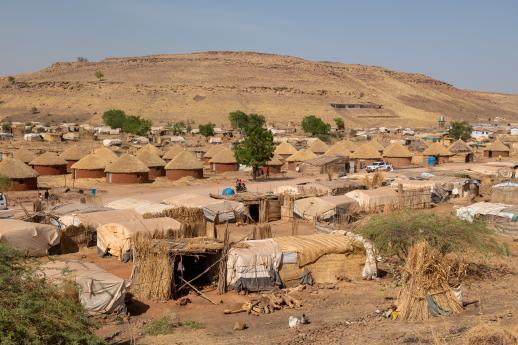
The Um Rakuba camp where SFPA has set up a clinic.
Hannah Maule-ffinchSFPA is more than well-placed to provide this sort of service. Having been established in 1965 by pioneers in obstetrics and gynaecology in response to increases in maternal, neonatal, and infant mortality and morbidity, they are now one of the leading organizations in Sudan providing a wide range of sexual and reproductive health services.
Their clinic in the Um Rakuba refugee camp is made from corrugated metal, a cost-effective product that is relatively inexpensive to install but creates a hot box effect inside. This doesn’t dissuade people from coming to the clinic, which is open five days a week and includes doctors, nurses, midwives, psychiatrists, a laboratory technician, and a pharmacist. The services are free, as is the medicine. It takes a village to make a clinic like this one run as well as it does.
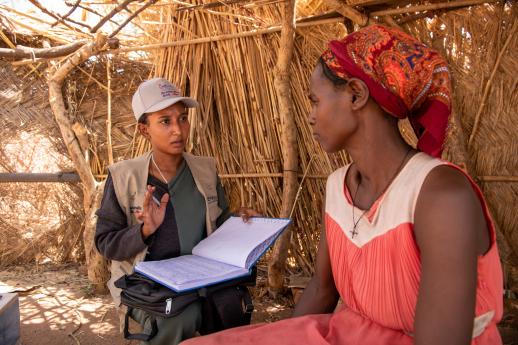
Community mobilisers reach out to people living in the camp to raise awareness of the services provided by the clinic.
Hannah Maule-ffinchThe Um Rakuba refugee camp, with a population of over 20,000 people and growing, is the size of a small town. Not everyone knows about the SFPA clinic with the pink walls, but SFPA wants everyone to know about it. Because of this, the team deploys community mobilisers to walk the rows of huts and tents and inform residents, one by one, of the clinic and what it can offer.
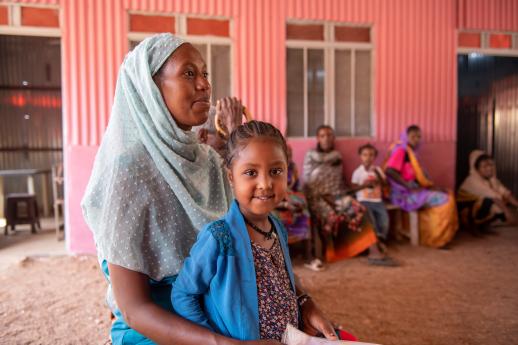
The clinic provides many sexual and reproductive health services.
Hannah Maule-ffinchEvery day, without fail, a line of people forms outside the clinic to be registered upon entry and then wait their turn on the rows of wooden benches that have been placed in the middle of the clinic. A fan whirs overhead, taking the edge of the heat.
One of the clients waiting patiently is a young woman, Trahas, with her three-month-old baby. Having arrived in Um Rakuba camp over a year ago, she witnessed many women suffer miscarriages on what she describes as a “long and painful” journey to Hamdayat, just over the border in Sudan.
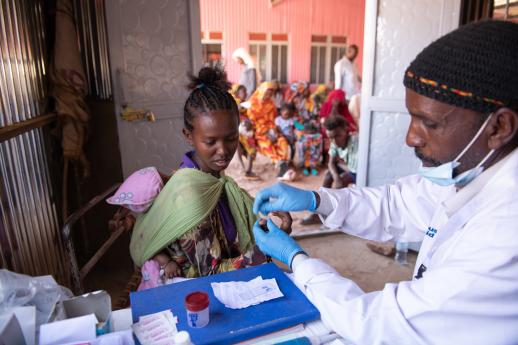
Trahas visiting the clinic's lab for some tests.
Hannah Maule-ffinchBefore the civil war broke out, Trahas, 19, lived a relatively “normal life” in Ethiopia. She loved hanging out with her friends and socialising. In order to earn a living and support her family, she moved to Humera, a town situated on the border of Ethiopia, Eritrea, and Sudan, selling tea and coffee to the locals. Her spontaneity and bravery would prove useful for the unpredictable events yet to unfold.
At the onset of the conflict, Trahas made the quick decision to join her friend and a group of people heading for the Sudanese border, leaving her family and loved ones behind. During the war, many families were separated, and like Trahas, Um Rakabu refugee camp is full of teenagers and youth who fled Northern Ethiopia alone. It is estimated that more than 30% of refugee arrivals are under the age of 18.
Once a refugee in Sudan, Trahas formed a relationship with her friend from Tigray, “I had a relationship with him because I did not have any family member or relatives here in Sudan.”
The then heavily pregnant 19-year-old Trahas first came to the Sudan Family Planning Association clinic with one aim, “to save my baby.” She heard about the antenatal services available in the camp from neighbours and other women who had visited the clinic. “I came here for antenatal care and was referred to MSF [Médecins Sans Frontières], where I delivered my baby and returned to SFPA for postnatal care.” She is grateful for the life-saving services at SFPA and is just glad her baby is healthy and happy.
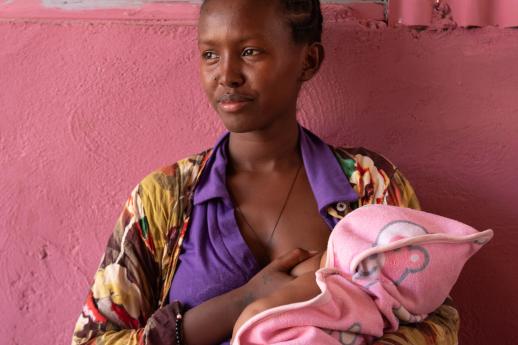
Trahas with her 3-month year old baby girl in the clinic.
Hannah Maule-ffinchNow back in the clinic for another visit, Trahas wraps her three-month-old sleeping baby firmly on her back while she waits for her medical results following complaints of a stomach ache that morning. Surrounded by other Tigrayan women and their babies in the SFPA clinic, Trahas reflects on her now year-long stay in Sudan. “My partner and his mother abandoned me shortly after I gave birth, and I was afraid to be a single mother with no support. My neighbours in the camp they check on me.”
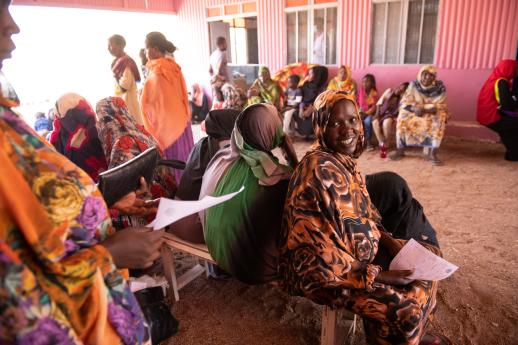
The clinic is always busy with patients requiring treatment, care and advice.
Hannah Maule-ffinchThe clinic houses an ultrasound machine, one of the very few available in the refugee camp, and which forms part of the suite of prenatal services available to expectant mothers at the clinic. On top of this, it also provides pregnancy and HIV testing, STI testing and management, postnatal care, and both long and short-acting contraceptives.
Like most other refugees from Ethiopia, her life is currently in limbo, Trahas smiles as she talks about her future in Sudan, “I would like to look for a job as a cleaner to earn money and take care of my daughter.”
The SFPA clinic is the only provider of family planning commodities in the Um Rakuba refugee camp, and the female-led clinical team is an exemplar of humanitarian aid being delivered in the most difficult of circumstances. As the crisis in Tigray shows no signs of abating, and the future of refugees remains uncertain, the urgency and necessity of sexual and reproductive healthcare must not be forgotten.
The Sudan Family Planning Association is a Member Association of the International Planned Parenthood Federation







